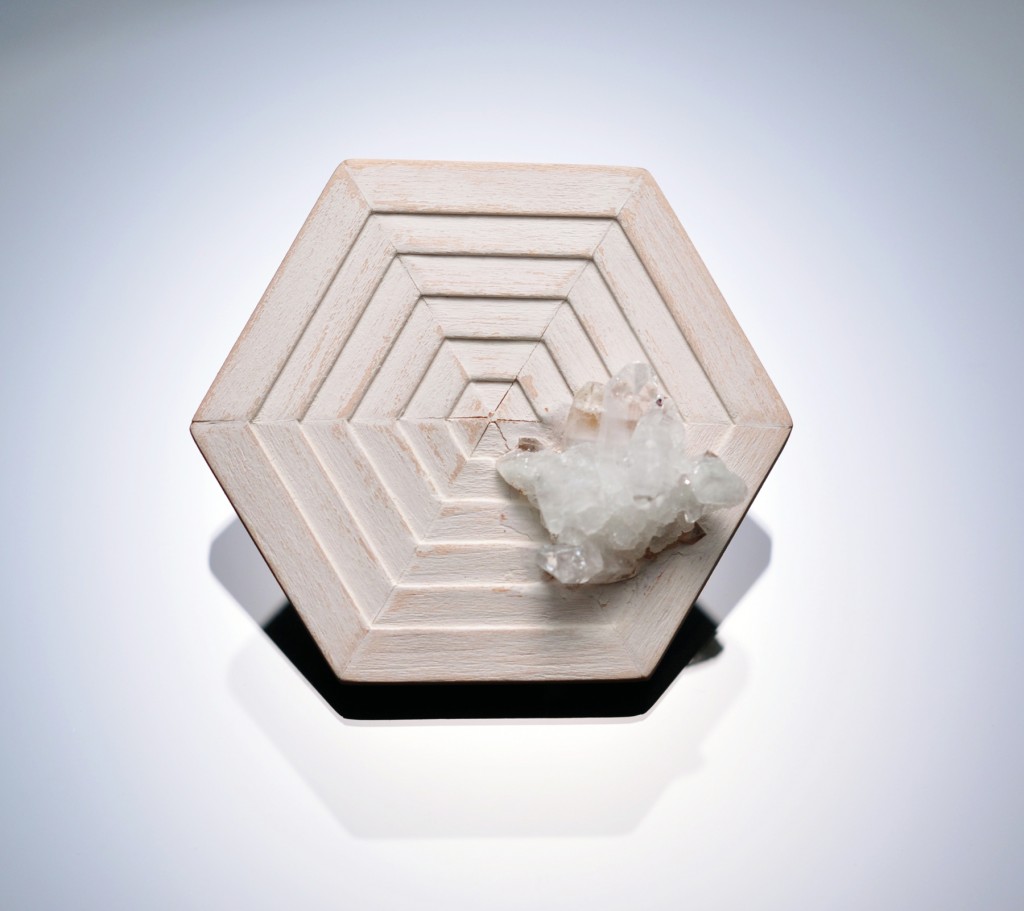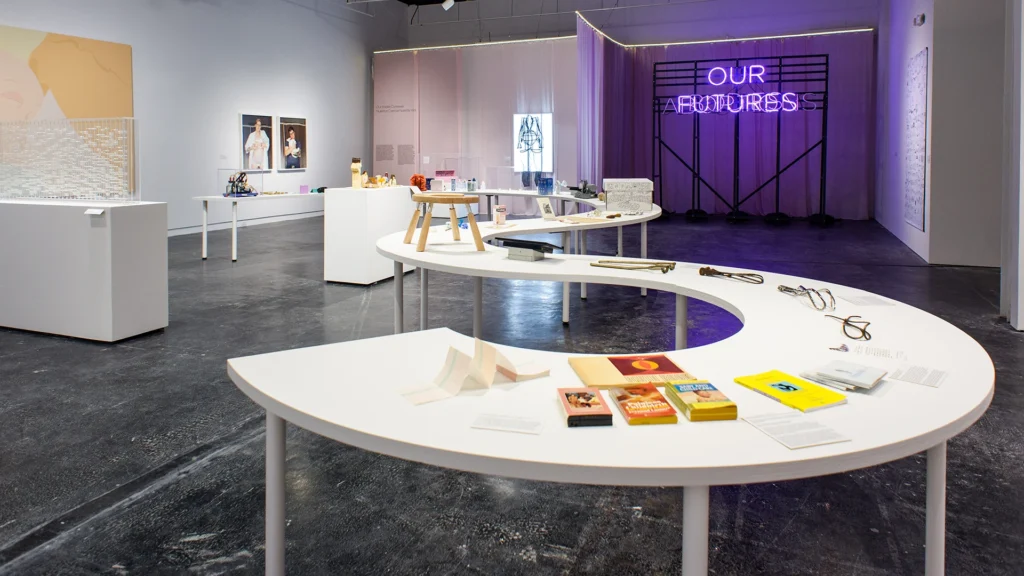Opening Reception:
Friday, October 19, 2012
5:30, Artist Talks
6:00 – 7:00 PM, Reception
Houston Center for Contemporary Craft (HCCC) is pleased to present In Residence 2011, an exhibition of work created by the eight artists who began their residencies at HCCC in 2011: Celia Butler, Jamie Diaz, Nathan Dube, Marcia Erickson, Paula Haymond, Leslie Shershow, Melissa Walter, and John Zimmerman.
Each fall, the In Residence exhibition series features a collective display of the creativity that permeates the Artist Hall—a space that serves as home to the resident artists’ studios, as well as small exhibitions. The HCCC Artist Residency Program not only gives its selected artists studio space but also provides an environment in which they can share ideas, collaborate, experiment, seek advice from peers and speak with the general public about their work and the greater world of contemporary craft. (Click here to read more about the Artist Residency Program.)
Mixed-media artist Celia Butler represents a growing trend of artists who make inter-disciplinary craft. By combining pulled-sugar objects with photographs that directly reference fashion media, Butler’s work explores issues surrounding the image of the contemporary idealized female. Incorporating imagery evocative of childhood, perfection, innocence, fragility and sweetness with sexuality and adolescent awakening, Butler’s beautifully enticing, delicious works invite viewers to re-evaluate and critique the physical and behavioral stereotypes imposed on females of all ages.
Ceramic artist Jamie Diaz’s functional porcelain is inspired by the innate human need for attachment and relationships. Individual vessels, such as cups, teapots, sugar bowls and creamers, nestle together inside larger fluid forms. Diaz considers the quantity, size and placement of each piece when developing her compositions for these groupings. In her works, each individual piece has a home, a designated placement within the larger group of objects.
Metalsmith Nathan Dube explores gender identity from the male perspective in his exquisitely crafted, comical objects. Using an aesthetic that fools many into thinking his hand-wrought pieces are industrially manufactured, Dube creates modern, grown-up interpretations of mischievous toys for boys. Pieces, such as Popgun, which consists of a spit-wad shooter that allows you to take aim at an iconic cowboy from one of three generations: John Wayne, Paul Newman or Billy Crystal, examine the role of cultural influences in forming contemporary, American male identity.
During her residency, Marcia Erickson sought to refine her functional ceramic pieces by exploring the myriad possibilities of surface texture and design allowed by the materiality of clay. Using stamps, sgraffito (a technique of scratching through the surface to reveal the color below), and a variety of glaze combinations, Erickson’s works articulate and record her reactions to her everyday environment.
Paula Haymond was drawn to wood as an artistic medium when she discovered the lathe, a machine tool that rotates the wood on its axis, allowing a worker to cut, sand, drill and shape the wood. After she turns her vessels, Haymond uses a variety of techniques to color, pierce and carve, transforming the wood into whimsical, narrative pieces that express the wonder she finds in the natural Texas landscapes and the open pastoral scenes of her native home of Indiana. She is enticed by the wide variety of woods available, and her imagery is often inspired by the material’s natural characteristics, such as the grain, cracks and figures.
During her time at HCCC, metalsmith and jeweler Leslie Shershow created a body of work titled Maine Series. Using wood and silver, rope and crystals, these architectural pieces reference her nostalgia for the ramshackle houses of the Maine landscape she inhabited each summer as a child. In Siding, intricately fastened pieces of wood evoke slowly deteriorating planks on a dock or the roofing shingles covering boathouses and seaside shacks, allowing the viewer’s imagination to conjure scenes of a homey, nautical and serene landscape. Employing the inevitable deterioration and weathering of man-made structures, Shershow pays homage not only to the stingy, self-determined home-improver but also conjures the histories hidden in buildings and the impossibility of undoing time.
Melissa Walter’s purely abstract and decidedly un-wearable wall works have grown out of her background as a jeweler and metalsmith. Initially interested in the space and relationships between people and the objects, these sculptural works relate only to each other; they cannot be worn. Ranging in different sizes, these lozenge-shaped wall pieces nonetheless are meditations on adornment and the possibilities of objects to mediate relationships. Mounted in groupings of two or more, these works nest and stand-off, gather and disperse, like groups of people jockeying for personal space.
“Big History,” a field of study that attempts to understand and contextualize the universe’s history holistically, from the Big Bang until the present day, pervades the work of ceramic artist, John Zimmerman. Zimmerman translates this concept into sculptures that juxtapose the forms of ordinary, ubiquitous contemporary objects with incredibly articulated relief surfaces meant to evoke the stratification of rock and the accretion of time. His works are heavy, but not just in weight—these objects are reminders that all living things, inanimate objects and new innovations alike are inextricably products of the past, dependent upon evolutionary history and previous discoveries for their existence.
Pictured: (1) Celia Butler, “Sugar Gloss.” Archival inkjet print. 2011. Photo courtesy of the artist. (2) Nathan Dube, “Popgun.” Silver, nickel, brass champagne party popper, walnut and paper. 2012. Photo courtesy of the artist. (3) Marcia Erickson, “Pair Cups.” Woodfired porcelain. 2012. Photo courtesy of the artist. (4) Paula Haymond, “White Linen.” Magnolia, turned, carved and textured with NSK Presto, high-speed dental drill. Titanium white with airbrushed acrylics underneath to create more of a golden appearance when the irises are textured. Gold acrylic accent along the top rim. 2012. Photo courtesy of the artist. (5) Leslie Shershow, “Siding.” Wood, silver, silver, paint, steel and calcite. 2012. Photo courtesy of the artist. (6) Melissa Walter, “Untitled (teal and black).” Masonite, cement, charcoal, acrylic paint and beeswax. 2012. Photo courtesy of the artist. (7) John Zimmermann, “Stratified Traffic Light.” Glazed ceramic and mixed media. 2012. Photo courtesy of the artist.


